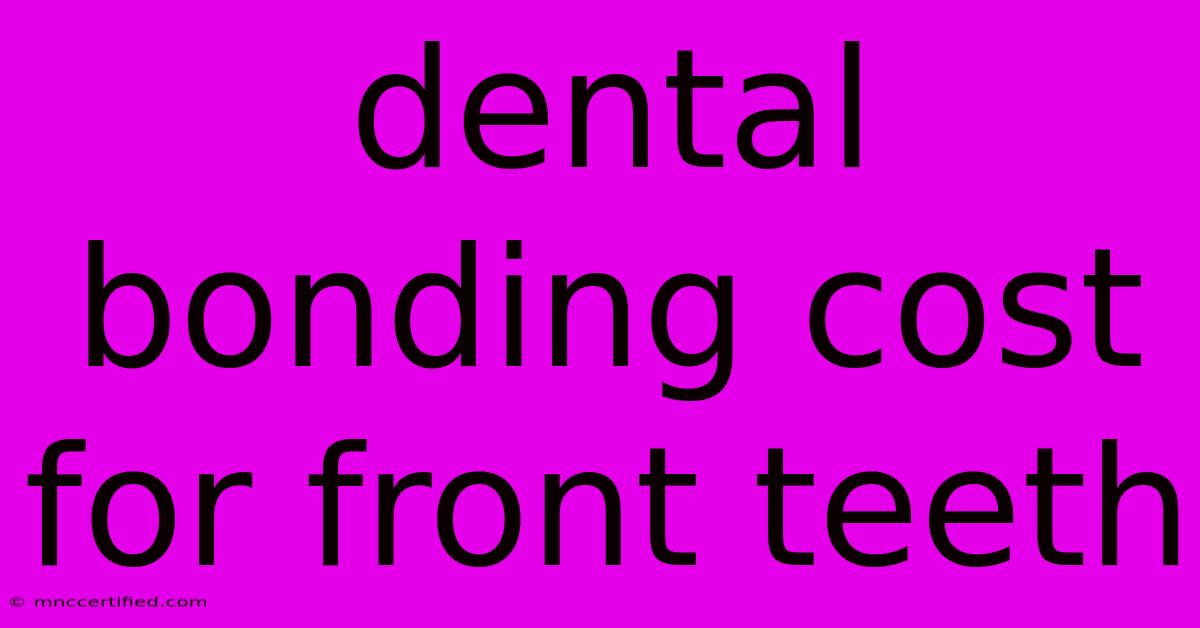Dental Bonding Cost For Front Teeth

Table of Contents
Dental Bonding Cost for Front Teeth: What to Expect
A bright, confident smile can boost your self-esteem and leave a lasting impression. If your front teeth are chipped, cracked, discolored, or have minor gaps, dental bonding might be the perfect solution. This cosmetic procedure involves applying a tooth-colored composite resin to the surface of your teeth, shaping it to create a natural-looking, flawless smile.
But before you schedule an appointment, you probably have a question on everyone's mind: How much does dental bonding cost?
Understanding Dental Bonding Costs
The cost of dental bonding for front teeth can vary significantly, influenced by several factors:
- The number of teeth being bonded: Naturally, bonding multiple teeth will cost more than just one.
- The complexity of the procedure: Simple repairs like fixing a small chip will be less expensive than a more involved procedure like closing a gap.
- The location of the dental practice: Costs can vary depending on the region and the dentist's experience and expertise.
- The type of composite resin used: Premium resins may offer better color matching and durability, but come at a higher price.
Average Cost of Dental Bonding
It's hard to give a precise figure, but you can expect to pay between $300 and $600 per tooth for dental bonding. This range reflects the average cost across the US, but it's essential to consult with a dentist in your local area for an accurate estimate.
Is Dental Bonding Right for You?
While affordable compared to other cosmetic procedures like veneers, dental bonding may not be the best option for everyone. Here are some factors to consider:
Advantages:
- Affordable and minimally invasive: Bonding is a relatively quick and painless procedure that doesn't require removing any tooth structure.
- Versatile and customizable: It can address various aesthetic issues, from chipped teeth to minor gaps.
- Natural-looking results: With skilled hands, dental bonding can seamlessly blend with your existing teeth.
Disadvantages:
- Not as durable as veneers: Bonding is susceptible to staining and can chip or break over time, requiring repairs.
- Limited to minor imperfections: Severe damage or discoloration may necessitate alternative solutions.
- Not permanent: The composite resin may need to be replaced every few years.
Finding a Dentist and Getting an Estimate
If you're considering dental bonding, it's crucial to find a qualified and experienced dentist who specializes in cosmetic dentistry.
- Ask for recommendations: Seek referrals from friends, family, or your primary care physician.
- Check online reviews: Read reviews on websites like Yelp or Healthgrades to get a sense of the dentist's reputation and patient satisfaction.
- Schedule a consultation: Meet with the dentist, discuss your concerns, and ask for a personalized quote.
Pro Tip: During your consultation, don't hesitate to ask the dentist about the different types of composite resins available and their respective costs.
Conclusion
Dental bonding can be a great way to enhance your smile and boost your confidence. By understanding the average cost, considering the pros and cons, and consulting with a qualified dentist, you can make an informed decision about whether dental bonding is the right choice for you. Remember, a brighter smile is within reach!

Thank you for visiting our website wich cover about Dental Bonding Cost For Front Teeth. We hope the information provided has been useful to you. Feel free to contact us if you have any questions or need further assistance. See you next time and dont miss to bookmark.
Featured Posts
-
Yellowstones Costner Exit Fans React With Fury
Nov 12, 2024
-
Richard Allen Guilty Jury Reaches Verdict In Double Murder
Nov 12, 2024
-
Tesla Stock Up Key Drivers And Trends
Nov 12, 2024
-
How To Know If Your Cats Are Bonded
Nov 12, 2024
-
Man Convicted In Delphi Murders Trial
Nov 12, 2024